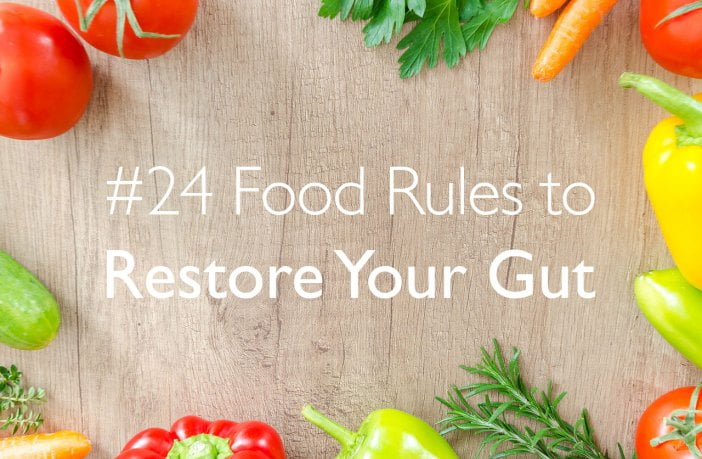
There is much that scientists are still to learn about our gut microbiota – including what a healthy gut microbiome should look like – particularly as this may vary for each of us. However there are a few areas that they are in agreement about
- A healthy gut tends to be associated with more diverse microbiota
- Diversity in our microbiota is achieved through a varied diet
- A plant based diet will promote healthier microbiota
- Sugars and refined starch promote the growth of undesirable bacteria and microbes
- Processed foods, preservatives and food additives harm our gut microbiota
Now while this is fairly easy to follow – it can become a little more difficult when we try and put it into practice as we’re constantly bombarded with messages telling us what to eat – that appeal to our carvings – our hunger and the need for convenience in our busy stressful lives.
So to try and help we’ve taken inspiration from Michael Pollan’s rules for healthy eating and created a list of our favourites – including a few more of our own:
1. Eat Mostly Plants – Especially Leaves
 A lack of plant fibre is consistently linked with obesity, metabolic syndrome and chronic disease. As Michael Pollan points out “vegetarians are notably healthier than carnivores, and they live longer.”
A lack of plant fibre is consistently linked with obesity, metabolic syndrome and chronic disease. As Michael Pollan points out “vegetarians are notably healthier than carnivores, and they live longer.”
As well as being rich in fibre, leafy greens such as Kale, Swiss chard, mustard greens, spinach, arugula, are surprisingly rich sources of vitamins and nutrients .
As many as 40% of American adults are deficient in vitamins A, C, K, and E as well as minerals such as calcium, magnesium, potassium, manganese and fibre.
These vitamins and minerals are all important to our gut health, our immune system, our cardiovascular health and even our skin – and all of which are found in abundance in leafy greens such as spinach, kale, arugula, and swiss chard
2. Only Eat Food That Will Rot
 Or as Michael Pollan says, “Dont eat food that doesnt rot.” Processed foods are designed to make food last longer. More often than not the more processed a food is, the more preservatives and emulsifiers it will contain (and therefore, less susceptible to rot).
Or as Michael Pollan says, “Dont eat food that doesnt rot.” Processed foods are designed to make food last longer. More often than not the more processed a food is, the more preservatives and emulsifiers it will contain (and therefore, less susceptible to rot).
Preservatives and Emulsifiers are chemicals that are designed to kill or inhibit the growth of bacteria – and stop food going off. This is fine for preserving the shelf life of a bottle of mayonnaise – however when we eat that mayonnaise the additives – perhaps unsurprisingly have a similar disruptive effect on our gut bacteria.
Look out for additives in any processed foods you buy – or better still avoid processed foods and only eat food that will rot.
3. Use Meat to Flavour or as a Treat
 Aside from the ethical questions over intensive animal farming methods and animal welfare, there are many environmental arguments as to why we should eat less meat – from its contribution to an inefficient food system, the pollution of American water supplies, and to the increasing prevalence of antibiotic-resistant diseases.
Aside from the ethical questions over intensive animal farming methods and animal welfare, there are many environmental arguments as to why we should eat less meat – from its contribution to an inefficient food system, the pollution of American water supplies, and to the increasing prevalence of antibiotic-resistant diseases.
We are not suggesting you should stop eating meat – or that it is bad for us – a little meat won’t kill you, but it’s better approached as a side dish than as a main. A diet that emphases vegetables and plant fibre over meat and dairy will lead to much better health for your gut and body in general.
4. Eat Animals that have Themselves Eaten Well
 As Michael Pollan highlights – the diets of the animals we rear for food (meat, dairy, or eggs) affects the quality of that food.
As Michael Pollan highlights – the diets of the animals we rear for food (meat, dairy, or eggs) affects the quality of that food.
Should we expect animals fed on a high energy diet, growth promoting hormones and antibiotics, housed in cramped conditions without access to daylight – to be good for us and provide the nutritional benefits?
The food industry’s focus on maximising yield and minimising cost has resulted in changes to the diet of most of the animals we rear for meat – in ways that damage their health and with similar consequences for our health. Ruminants such as cows and sheep that have evolved to eat grass, yet we insist on feeding them grain. The food from these animals will contain much healthier types of fat (more omega-3’s, less omega-6’s) as well as appreciably higher levels of vitamins and antioxidants.
5. Eat Colours
 “The idea that a healthy plate of food will feature several different colors is a good example of an old wives’ tale that turns out to be good science too.” says Pollan: The colors of many vegetables reflect the different antioxidants and phytochemicals they contain – all of which feed our gut bacteria and help reduce inflammation.
“The idea that a healthy plate of food will feature several different colors is a good example of an old wives’ tale that turns out to be good science too.” says Pollan: The colors of many vegetables reflect the different antioxidants and phytochemicals they contain – all of which feed our gut bacteria and help reduce inflammation.
Red foods including tomatoes, watermelon, cherries, radishes, beetroot and peppers. These are foods that are likely to be rich in the antioxidants anthocyanin and lycopene, – all good for heart health.
Orange and yellow foods get their pigment from beta carotene, which is converted to vitamin A when digested and is vital for good bones and healthy skin.
Green vegetables are rich in vitamins C, K and E, which can all help support the immune system, healthy eyes and bones and reduce your risk of chronic diseases.
While Blue and purple fruits and vegetables get their color from anthocyanins. Blue foods like blueberries have compounds that act as anti-inflammatories, reducing the risk of disease in your esophagus and colon.
6. Only Eat Junk Food you have Cooked Yourself
 Cooking ‘junk food’ from scratch – will help you cut out many of the harmful ingredients present in fast foods and processed snacks – such as emulsifiers, preservatives, excitotoxins, artificial colours and flavours – as well as hydrogenated fats and oils – all of which harm our gut.
Cooking ‘junk food’ from scratch – will help you cut out many of the harmful ingredients present in fast foods and processed snacks – such as emulsifiers, preservatives, excitotoxins, artificial colours and flavours – as well as hydrogenated fats and oils – all of which harm our gut.
If you’ve ever made junk food at home, you have to wash the ingredients, peel, slice, fry, mix and then salt and season. You will make a mess but it will be fun. However most importantly – even with all the oil, butter, fat, salt and sugar you’ll be using – you will be producing healthier food – free of additives and flavour enhancers – than you will find in commercial foods. What is more – as you cook from scratch (reheating a jar or tin doesnt cut it) you will be more mindful of the ingredients you are using – and your palette will become more sensitive Eat anything you want, just cook it yourself.
7. Shop the Edge of the Supermarket – Avoid the Aisles
 The edge of the supermarket or grocery store contains all the fresh fruit and veg, fresh meat and dairy – near the loading docks, where it can be replaced when it goes bad. The aisles meanwhile are home to processed foods and sugary drinks – foods that don’t go off and that harm your gut.
The edge of the supermarket or grocery store contains all the fresh fruit and veg, fresh meat and dairy – near the loading docks, where it can be replaced when it goes bad. The aisles meanwhile are home to processed foods and sugary drinks – foods that don’t go off and that harm your gut.
Work your way round the edge of teh supermarket first filling your trolley or basket with real food that goes off.
Shop the aisles for whole grains, pulses and packaged whole foods – such as tinned tomatoes, beans.
Buy real food that goes off!
8. The Whiter the Bread – the Sooner You’ll be Dead
 Now this old wives tail couldn’t be more relevant today. White bread is little more than starch – a slightly more complex form of sugar but broken down just as quickly and with the same effect on the body.
Now this old wives tail couldn’t be more relevant today. White bread is little more than starch – a slightly more complex form of sugar but broken down just as quickly and with the same effect on the body.
Switching to brown or wholemeal breads provides fibre we need to reduce inflammation and for the health of our gut and slows down the absorption of starch.
Fiber – of which there are many types – works wonders for our gut – soluble fiber feeds our healthy gut bacteria and is transformed into Short chain fatty acids such as butyrate – that helps to reduce inflammation and restore the health of our gut lining. It also helps fill us up and helps reduce excess.
9. Don’t Eat Anything Your Great-Grandmother Wouldn’t Recognise
 The message here is to eat food, not food products. The invention of margarine is a great example – marketed as a healthier version of butter, we’re now learning about how harmful margarine and other spreads laced with trans fats really are – and how grass fed butter isn’t bad for us after all.
The message here is to eat food, not food products. The invention of margarine is a great example – marketed as a healthier version of butter, we’re now learning about how harmful margarine and other spreads laced with trans fats really are – and how grass fed butter isn’t bad for us after all.
Sadly the message is slow to filter through and we’re all too susceptible to advertising and marketing messages telling us to eat new products.
If it didn’t exist 70 years ago then its not real food and you should avoid it.
10. Sweeten & Season Your Food Yourself
 Foods and beverages that have been prepared by corporations contain far higher levels of salt and sugar than any ordinary human would ever add” says Pollan.
Foods and beverages that have been prepared by corporations contain far higher levels of salt and sugar than any ordinary human would ever add” says Pollan.
If you season and sweeten foods yourselves you’ll find you’ll be consuming far less salt, calories – as well as avoiding other harmful additives.
Better still if you cook the food from scratch – in which case you’ll also be omitting all the additives and favour enhancers that are so common in commercial food and even restaurants.
11. Don’t Forget to Eat Oily Fish
 There is one food you should be eating (which you probably aren’t) – and that is oily fish. Fishes such as Mackerel, Herring, Salmon, Trout and Sardines are all high in healthy oils such as omega 3’s and packed with other vitamins and nutrients.
There is one food you should be eating (which you probably aren’t) – and that is oily fish. Fishes such as Mackerel, Herring, Salmon, Trout and Sardines are all high in healthy oils such as omega 3’s and packed with other vitamins and nutrients.
In addition oily fish such as whitebait, canned sardines, pilchards and tinned salmon are good sources of calcium and phosphorus which can help keep our bones strong.
12. Have a Glass of Wine with Dinner
 A glass of wine is good for you. Red wine is especially rich in polyphenols and anti-oxidants – which help reduce oxidative stress and inflammation. Irish physician Samuel Black first noticed how the French suffer a relatively low levels of coronary heart disease, despite having a diet relatively rich in saturated fats – an observation later credited to their Mediterranean diet and red wine consumption.
A glass of wine is good for you. Red wine is especially rich in polyphenols and anti-oxidants – which help reduce oxidative stress and inflammation. Irish physician Samuel Black first noticed how the French suffer a relatively low levels of coronary heart disease, despite having a diet relatively rich in saturated fats – an observation later credited to their Mediterranean diet and red wine consumption.
Alcohol in moderation- and red wine in particular has been shown to be better for longevity than abstinence.
13. Enjoy Meals with People You Love
 Dinners with family and friends build relationships. They help your kids do better in school, they benefit your relationships with your partner, your colleagues and your friends.
Dinners with family and friends build relationships. They help your kids do better in school, they benefit your relationships with your partner, your colleagues and your friends.
Families traditionally ate together, around a table and not a TV, at regular meal times. It’s a good tradition. “Remember when eating between meals felt wrong?” Pollan asks.
Sadly studies suggest that the majority of American families eat together less than 1 in 4 meals together, missing out on sharing this valuable time as a family.
14. Pay More, Eat Less.
 Food has got cheaper over the last few decades, and we’ve been spending a smaller percentage of our income on it. Now we’re eating more and more calories but getting less nutritional value from it and our food wastage is mounting. Americans spend, on average, only 6 percent of their income on food, down from 24 percent in 1947, far less than any other nation.
Food has got cheaper over the last few decades, and we’ve been spending a smaller percentage of our income on it. Now we’re eating more and more calories but getting less nutritional value from it and our food wastage is mounting. Americans spend, on average, only 6 percent of their income on food, down from 24 percent in 1947, far less than any other nation.
Our farming practices and food industry is focused on quantity and yield at the expense of quality, variety and value. Eat less and waste less but be willing to pay a bit more for foods with more flavour and nutrition.
Pay a bit more for that wild salmon, the grass-fed beef, and the organic milk but reduce the amount you consume (particularly for red meat) – and the amount that goes to waste.
15. Don’t Eat Food that is Advertised
 “94% of advertising budgets for food are for processed food. Real food is not being advertised” says Pollan. The farmer doesnt have money to advertise his broccoli.
“94% of advertising budgets for food are for processed food. Real food is not being advertised” says Pollan. The farmer doesnt have money to advertise his broccoli.
Advertising is fuelling the profits of the large corporations such as Nestle, Coca-Cola, Pepsi and Kraft-Heinz. These companies don’t produce healthy food!
Whats more – avoid any food that claims to have health benefits – these claims such as “No added sugar” or “contains whole wheat” can create the false impression that a product is healthy when it’s not.
16. Eat Food With 5 ingredients or Less
 This rule is intended to help differentiate between lightly processed foods – such as olive oil, flour and yogurt – and highly processed foods such as ready meals, chips and fast foods.
This rule is intended to help differentiate between lightly processed foods – such as olive oil, flour and yogurt – and highly processed foods such as ready meals, chips and fast foods.
When we say 5 ingredients we mean on the label – not in the recipe. The number of ingredients a packaged food contains is a very good indication of how processed it is – and therefore how bad it is for you.
Whats more you should be extra fearful if you don’t recognise or worse still can’t pronounce any of the ingredients on the label.
17. Plant a Vegetable Garden
 Plant a Vegetable Garden if You Have the Space, a Window Box if You Don’t. Our relationship with food and nature has been severed with the advent of industrial agriculture. The soil is rich in microbes and getting our hands dirty – as well as eating foods that we have planted and grown at home – is a rewarding activity with untold benefits for our gut health.
Plant a Vegetable Garden if You Have the Space, a Window Box if You Don’t. Our relationship with food and nature has been severed with the advent of industrial agriculture. The soil is rich in microbes and getting our hands dirty – as well as eating foods that we have planted and grown at home – is a rewarding activity with untold benefits for our gut health.
Whats more your grocery bill is likely to increase if you are buying a lot of fresh food. By growing some of your own vegetables you can cut down on costs. You can even grow some vegetables all year round in a green house or even on your kitchen windowsill.
18. Eat at the Table, Never in a Car or Standing Up
 “Anything that arrives through a car window isnt real food” Likewise anything you can grab “on the go” while hopping between meetings or snacking on the way home – most likely isnt food either. Food is to be enjoyed and that requires more respect for meal times and environments.
“Anything that arrives through a car window isnt real food” Likewise anything you can grab “on the go” while hopping between meetings or snacking on the way home – most likely isnt food either. Food is to be enjoyed and that requires more respect for meal times and environments.
Sadly the average American eats one in every five meals in their car, one in four Americans eats at least one fast food meal every single day.
19. Eat When You Are Hungry, Never When You Are Bored

Two studies, reported at the British Psychological Society highlighted the effects of boredom on food choices and both found people are more likely to reach for junk food after completing a boring task.
“These results are in line with previous research [and]strengthen the theory that boredom is related to low levels of the stimulating brain chemical dopamine and that people try to boost this by eating fat and sugar if they cannot alleviate their boredom in some other way” Said Sandi Mann, the studies author
20. Always Leave the Table a Little Hungry
 It is not just what you eat but how you eat. The Japanese have a saying – eat until you are four-fifths full. Islamic culture has a similar rule, and in Germany they say, ‘Tie off the sack before it’s full.
It is not just what you eat but how you eat. The Japanese have a saying – eat until you are four-fifths full. Islamic culture has a similar rule, and in Germany they say, ‘Tie off the sack before it’s full.
“Always Leave the Table a Little Hungry” means that you should get in the habit of restraint and moderation and not eat too much
21. Eat What is in Season

One of the biggest benefits of eating seasonally is that you save money on food. At the peak of the harvest it costs less for farmers and the supply chain to get the food to you local store.
However the other notable benefits are that if you buy food that’s in season it will be fresher, having been picked more recently and travelled less distance to you and therefore taste better and be better for you.
It may seem like common sense, but with the incredible supply chains meeting demand for exotic foods – it’s one of those things many of us ignore when we’re shopping.
22. Drink Water

Drink Water! There are two messages here – the first is that water is what our bodies need to hydrate and function well – and very often we aren’t hydrating ourselves enough. Drinking more water can actually help us loose weight.
The second point here is that every where we go we are confronted by a range of drinks – sodas, high in sugar or low sugar, vitamin drinks, sports drinks, high sugar coffees. None of these do us any good – they whether high in sugar or artificial sweeteners they do our gut untold damage. Drink water – it is much better for you and might help you lose weight.
23. Leave Something on Your Plate
 Most of us grew up with the phrase “Finish everything on your plate!” or words to that effect repeated over and over…” Well for many of us these words have stuck and we – rightly perhaps don’t like to see wastage.
Most of us grew up with the phrase “Finish everything on your plate!” or words to that effect repeated over and over…” Well for many of us these words have stuck and we – rightly perhaps don’t like to see wastage.
(Aside perhaps from Texans who – I was proudly informed when I visited – have a tradition of leaving food on the plate to signify their wealth!)
Well rather the underlying message hear is not to condone or encourage wastage and signify wealth and excess – but rather for us to make a conscious effort to recognise when we are full or better still nearly full – and stop eating at that point.
24. All Things in Moderation, Including Moderation Itself
 One of my favourite sayings – I cant remember who or where I first hear this from – but it applies to all walks of life.
One of my favourite sayings – I cant remember who or where I first hear this from – but it applies to all walks of life.
Exercise self restraint most of the time – but reward yourself when you deserve it – and don’t let your discipline prevent you from enjoying the odd indulgence.
As has been noted in many studies – stress has been found to be just as harmful as a bad diet – so remember to enjoy life and treat yourself once in a while.
Disclaimer: We at Prepare for Change (PFC) bring you information that is not offered by the mainstream news, and therefore may seem controversial. The opinions, views, statements, and/or information we present are not necessarily promoted, endorsed, espoused, or agreed to by Prepare for Change, its leadership Council, members, those who work with PFC, or those who read its content. However, they are hopefully provocative. Please use discernment! Use logical thinking, your own intuition and your own connection with Source, Spirit and Natural Laws to help you determine what is true and what is not. By sharing information and seeding dialogue, it is our goal to raise consciousness and awareness of higher truths to free us from enslavement of the matrix in this material realm.
 EN
EN FR
FR



























Here is the source link PFC neglected to provide…I clicked on one of the live links in the article and then searched for the article by title. Lots of good articles on that site, thanks for posting this, PFC!
http://www.thegoodgut.org/24-food-rules-restore-gut-bacteria-health/
Would you make it possible to share your good articles on FaceBook by providing a link?
Thanks!